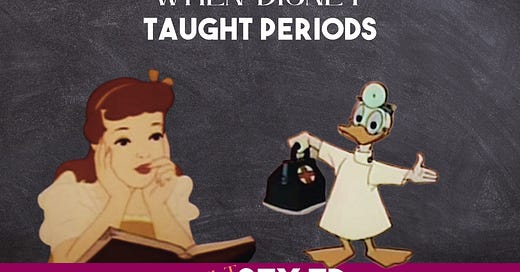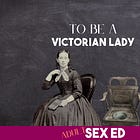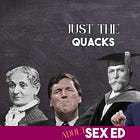Hi horny readers! Thank you so, so much for reading the ADULT SEX ED newsletter.
New here? Adult Sex Ed comedically challenges why we think what we think about sex. I’m Dani Faith Leonard, a filmmaker, comedy writer, and performer. In 2018, I started a comedy show called Adult Sex Ed and launched this newsletter in 2023. Each week, I take a fun deep dive into a topic that I’ve been researching. Ready to plug the holes in your education? Okay, let’s go!
This week, Disney announced that hundreds of employees would be laid off. This was celebrated by Disney critics, who snorted, “Go Woke, Go Broke” as they wheeled their latest treasures out of Hobby Lobby. That phrase has been adopted in recent years by critics of companies who they claim have succumbed to liberal ideals. Disney did have a high-profile fight with Florida governor Ron Desantis over his “Don’t Say Gay” Bill, but that legal fight ended last year.
The term “woke” was introduced by African Americans in the 1940s to “literally mean becoming woken up or sensitized to issues of justice," said linguist and lexicographer Tony Thorne. So, have Disney’s storylines actually become more woke over the years? Overall, the theme of most of the films is that good can triumph over evil. Cinderella has social justice themes. Mulan is about gender equality. Aladdin is about authenticity and responsible use of power. There was backlash when Halle Bailey was cast as The Little Mermaid, but it would be hard to call the actual story “woke,” since it was written in 1836.
Another scandalous title was 2022’s Turning Red by Disney and Pixar, where the metaphor of Mei turning into a red panda represents the changes of puberty (and periods). If only those scandalized folks knew that Disney has taught about periods before—way back in 1946. I originally wrote about sex ed and Disney in 2023. You can read the original here, or you can read on to find out more.
In the late 1940s, Disney produced a series of educational films that were shown in American classrooms. In 1946, the company released The Story of Menstruation, in partnership with Kotex. It was only a year after WWII ended, so with that in mind, the film is remarkably scientifically accurate, except for some erroneous PMS “cures.” The roughly 10 minute short is poetic at times, and filled with hilarious tips and tropes.
In the first minute, we’re introduced to a terrifying baby wearing lipstick. Wait, I thought this was about periods, not birth control! As the film goes on, that baby grows up and becomes a girl. We’re hilariously told that hormones create only four types of women–short, tall, heavy, and slight. The “heavy” woman is very thin. Then, the film explains menstruation in easy-to-understand language. But my favorite part begins when the film explains some of the issues women might experience on their periods:
“Some girls have a little less pep, a feeling of pressure in the lower part of the body. Perhaps an occasional twinge or a touch of nerves. But don’t let it get you down. After all, no matter how you feel, you have to live with people. You have to live with yourself, too!”
That truly is the most frustrating part about a period—living with people!
Other fun tips include not catching cold, avoiding constipation, bathing, and keeping up with exercise (but nothing too extreme, like bouncing on a horse). Don’t worry, you can still clean, but make sure to put on your make-up! Although the vintage tips and imagery are hilarious today, this film was groundbreaking at the time. It explicitly states that women can do anything on their periods, at a time when there was still a lot of period stigma. Even today, there are places around the world where women and girls can’t attend school while they menstruate.
In the 1960s, the birth control pill became widely available and Disney got back into the sex ed game with another video about family planning hosted by Donald Duck (you can find that one here). If you think that learning about overpopulation and birth control from an animated duck with notable anger issues is strange…that’s because it is. John Oliver thought this video was strange too, which he mentioned five years ago in an episode about population growth and China’s one baby rule.
So how can it be that people were up-in-arms about a film about periods three years ago when it was acceptable for the same company to make a video about periods in 1946? Maybe the culture has changed, not Disney. But don’t get too bent out of shape. Remember, you have to live with yourself!
Make sure you’re subscribed so you never miss a post!
If you enjoyed this newsletter, please share with friends, so they can be hilariously informed.
Don’t miss these recent newsletters:








